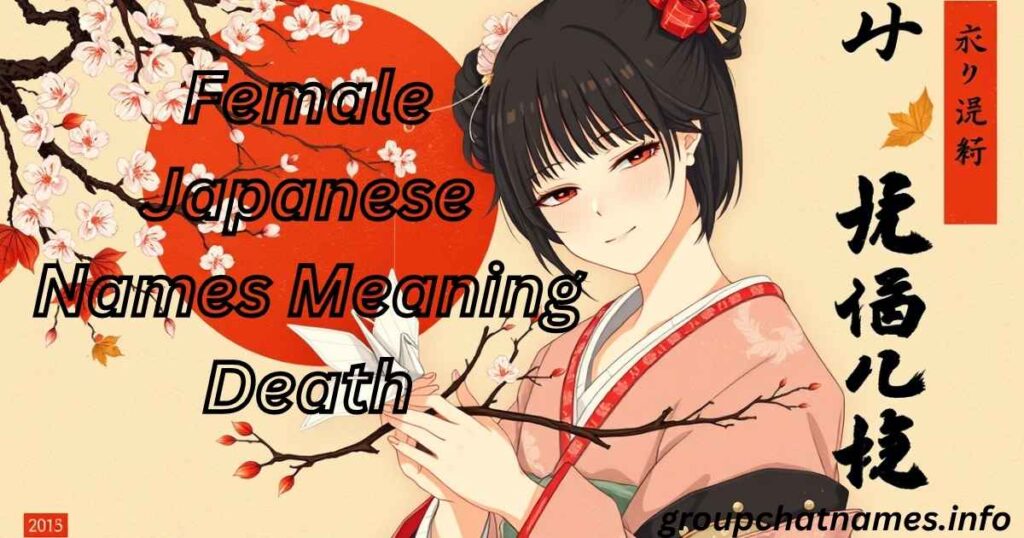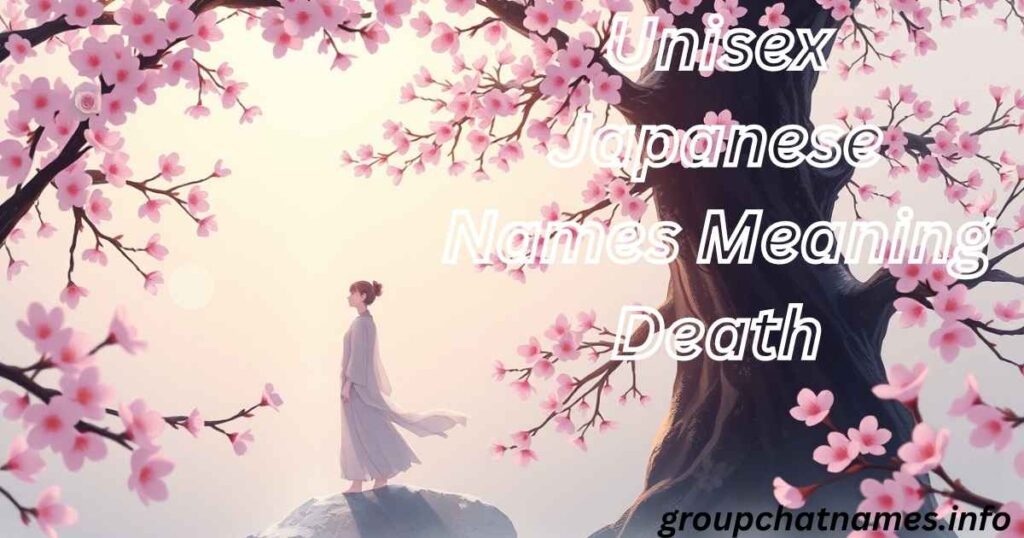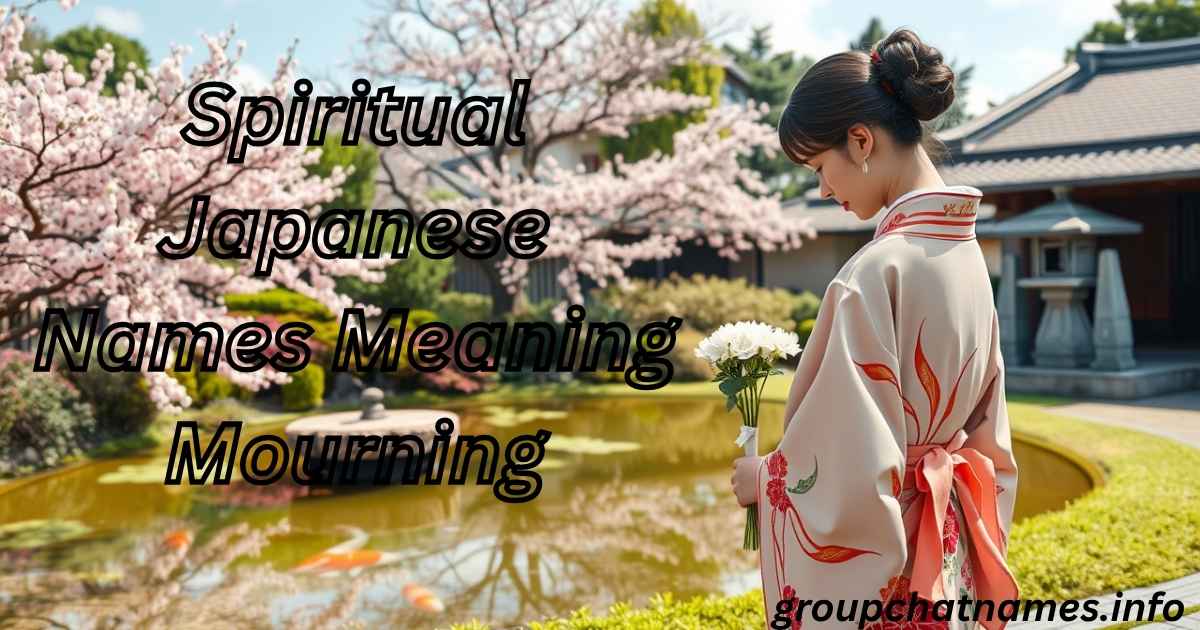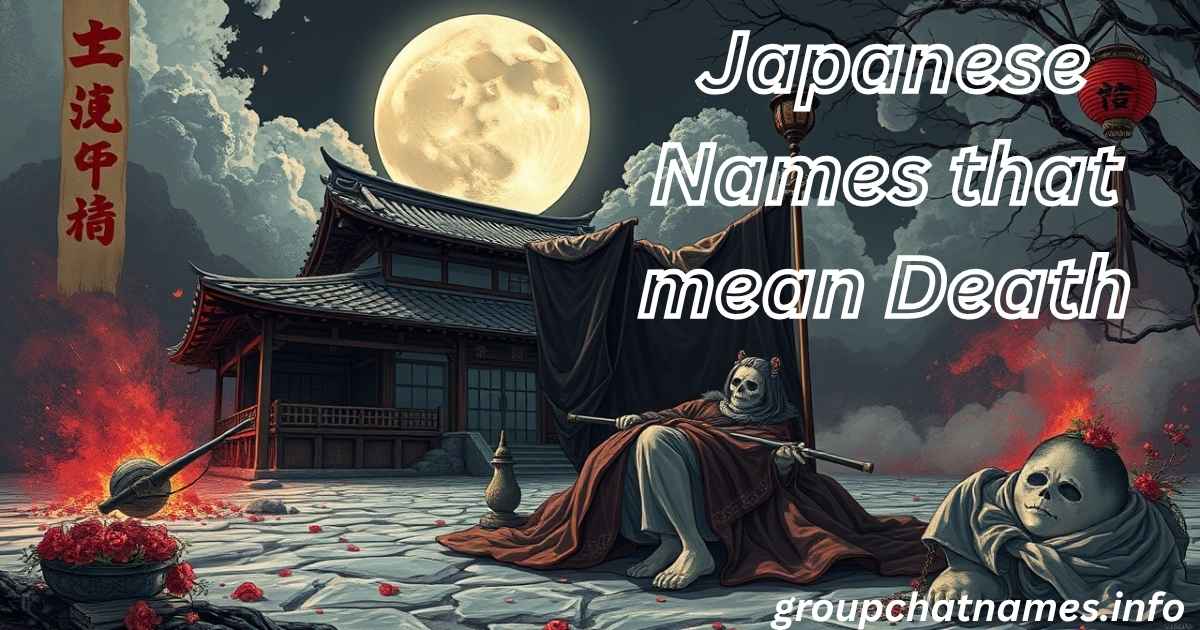Names hold power, especially in Japan. Some Japanese names that mean death carry mystery and deep meaning. These Japanese names that mean death aren’t just dark, they are full of beauty and respect for life’s end. Rooted in myths, nature, and ancient beliefs, they capture something spiritual and haunting. Whether for stories, games, or unique baby names, these rare names leave a strong impression.
You’ll discover many Japanese names that mean death, including Japanese girl names meaning death and even those meaning “angel of death.” Some are the very Japanese names for death itself. Legends and folklore add layers to these names. Writers love them for creating deep, emotional characters. These names whisper of shadow, farewell, and quietude. Dive into the world of Japanese names that mean death and uncover their hidden meanings.
Female Japanese Names Meaning Death

- Kura (暗) ,“Darkness,” representing the quiet shadow that follows the end of life.
- Higan (彼岸) ,“The other shore,” symbolizing crossing to the afterlife in Buddhist belief.
- Kasumi (霞) ,“Mist,” showing the fleeting, mysterious nature of life and death.
- Akane (茜) ,“Deep red,” like the red spider lily, a flower linked to death.
- Yami (闇) ,“Darkness,” reflecting the silence and shadow beyond mortal life.
- Rei (霊) ,“Spirit” or “soul,” referring to the spiritual presence after death.
- Hanae (花江) ,“Flower blessing,” reminding us of beauty even in the face of demise.
- Sayo (小夜) ,“Little night,” capturing the twilight between life and spiritual rest.
- Mika (美佳) ,“Beautiful fragrance,” like incense used in funerals for honoring souls.
- Shiho (志保) ,“Protector of will,” standing strong during mourning and spiritual journeys.
- Nozomi (望) ,“Hope,” a light beyond death, showing rebirth and enlightenment.
- Emi (恵美) ,“Blessed beauty,” symbolizing the grace that follows spiritual death.
- Yurei (幽霊) ,“Ghost,” a spirit that lingers between worlds, caught in silence.
- Miyu (美優) ,“Gentle beauty,” embodying the peaceful quietude after life’s end.
- Aya (彩) ,“Color,” representing life’s fleeting nature before the shadow of death.
- Chiyo (千代) ,“Thousand generations,” honoring ancestors and the legacy of death’s cycle.
- Rika (理香) ,“Logic and fragrance,” symbolizing calm acceptance of mortality and decay.
- Haruka (遥) ,“Distant,” evoking the farthest ends beyond life’s transient journey.
- Yuna (優奈) ,“Gentle and enduring,” reflecting the soul’s peaceful transition after death.
- Kaori (香織) ,“Fragrant weaving,” like incense threads connecting life and spiritual realms.
Male Japanese Names Meaning Death
- Enma (閻魔) ,“King of the underworld,” judge of souls after spiritual death.
- Shin (真) ,“Truth,” symbolizing the inevitable reality of mortality and demise.
- Rai (雷) ,“Thunder,” representing destruction and power in life’s final moments.
- Kaito (海翔) ,“Ocean flight,” suggesting the soul’s journey across the sea breeze beyond.
- Toshiro (俊郎) ,“Talented son,” one who faces death with courage and honor.
- Reiji (礼司) ,“Respectful rule,” showing dignity in mourning and spiritual farewell.
- Hikaru (光) ,“Light,” shining even in the twilight of life’s fading days.
- Sora (空) ,“Sky,” representing vastness beyond life and the afterlife’s unknown.
- Kazuki (和輝) ,“Peace and radiance,” symbolizing calm after life’s destruction and decay.
- Yoru (夜) ,“Night,” embodying silence and the shadow that death leaves behind.
- Takeshi (武) ,“Warrior,” facing mortality bravely through the cycle of life and death.
- Renji (蓮司) ,“Lotus ruler,” lotus flowers symbolize rebirth after spiritual death in Japan.
- Akio (明夫) ,“Bright man,” carrying hope through death’s darkest silence.
- Shiro (白郎) ,“White son,” purity connected to the soul’s journey beyond the grave.
- Masaru (勝) ,“Victory,” triumphing over fear of death and embracing rebirth.
- Hayato (隼人) ,“Falcon person,” swift spirit soaring beyond the underworld’s shadow.
- Kiyoshi (清) ,“Pure,” symbolizing enlightenment after passing beyond mortal life’s end.
- Daiki (大輝) ,“Great radiance,” reflecting soul’s eternal light after physical demise.
- Haruto (陽翔) ,“Sun flying,” sunlight filtering through trees, symbolizing hope after death.
- Shugo (守護) ,“Guardian,” protector of spirits crossing into the afterlife’s quietude.
Recommended Blog: 550+ Best Funny Duo Names For Team, Friends, and Gamers
Best Japanese Names That Mean Death
- Shinigami (死神) ,“God of death,” a mythological figure guiding souls to the afterlife.
- Higanbana (彼岸花) ,“Red spider lily,” flower symbolizing death and farewell in Japan.
- Reikon (霊魂) ,“Soul,” the essence that survives after physical demise.
- Kasumi (霞) ,“Mist,” representing life’s fleeting nature and the shadow of death.
- Enma (閻魔) ,“Underworld king,” judging spirits during their spiritual transition.
- Kiri (霧) ,“Fog,” obscuring the boundary between life and death’s quiet realm.
- Yami (闇) ,“Darkness,” symbolic of silence and end of life’s journey.
- Higan (彼岸) ,“Buddhist concept,” crossing from life to afterlife during the equinox.
- Akane (茜) ,“Deep red,” reflecting the color of mourning and spiritual death.
- Rei (霊) ,“Spirit,” the invisible presence continuing after body’s destruction.
- Shiho (志保) ,“Will protector,” representing strength amid mourning and farewell.
- Mika (美香) ,“Beautiful fragrance,” like incense honoring ancestors and memories.
- Yurei (幽霊) ,“Ghost,” the soul trapped between life and death’s silence.
- Haruka (遥) ,“Faraway,” symbolizing the soul’s distant journey beyond mortal limits.
- Tenshi (天使) ,“Angel,” often connected with the angel of death in folklore.
- Kage (影) ,“Shadow,” the silent companion of life’s final moments.
- Sayo (小夜) ,“Little night,” twilight hours that symbolize endings and farewells.
- Komorebi (木漏れ日) ,“Sunlight through trees,” a hopeful image amid death’s darkness.
- Fujin (風神) ,“God of wind,” a natural force symbolizing spiritual transition.
- Yume (夢) ,“Dream,” bridging life and the afterlife’s quiet and fleeting space.
Unisex Japanese Names Meaning Death

- Kai (海) ,“Ocean,” symbolizing the soul’s endless journey beyond life’s edge.
- Ren (蓮) ,“Lotus,” flower of rebirth and spiritual enlightenment after death.
- Aoi (葵) ,“Hollyhock,” linked to ancient traditions of death and rebirth.
- Yuki (雪) ,“Snow,” pure and silent, like the calm after life’s storm.
- Hikaru (光) ,“Light,” shining hope even in death’s darkest shadows.
- Akira (明) ,“Bright,” symbolizing enlightenment through spiritual death and rebirth.
- Sora (空) ,“Sky,” vast and eternal beyond the limits of mortal life.
- Mika (美佳) ,“Beautiful fragrance,” incense burning at funerals in remembrance.
- Kaze (風) ,“Wind,” unseen force that carries souls to the afterlife.
- Shinobu (忍) ,“Endurance,” strength in mourning and facing mortality calmly.
- Yoru (夜) ,“Night,” quiet and still like the soul’s final rest.
- Nao (尚) ,“Esteem,” honoring ancestors in spiritual and cultural traditions.
- Haruka (遥) ,“Faraway,” reflecting the distance souls travel after death.
- Kaoru (薫) ,“Fragrance,” like incense connecting living and the spirit world.
- Hana (花) ,“Flower,” representing life’s beauty and inevitable decay.
- Masaki (正樹) ,“True tree,” symbolizing rooted legacy after life’s end.
- Renji (蓮司) ,“Lotus ruler,” overseeing spiritual rebirth and enlightenment.
- Shion (紫苑) ,“Aster flower,” symbolizing remembrance and mourning.
- Itsuki (樹) ,“Tree,” standing strong through cycles of life and death.
- Tsubasa (翼) ,“Wings,” symbolizing the soul’s flight into the afterlife.
Mythological Japanese Names Meaning Death
- Shinigami (死神) ,“God of death,” guiding souls from life to the spiritual realm.
- Enma (閻魔) ,“King of the underworld,” judge of souls after death’s passage.
- Datenshi (堕天使) ,“Fallen angel,” symbolizing spiritual death and loss of purity.
- Ikiryou (生霊) ,“Living spirit,” a soul separated from the body while alive.
- Reikon (霊魂) ,“Soul,” the essence continuing after physical demise in Japanese lore.
- Kami (神) ,“God or spirit,” including deities connected to life and death.
- Yomotsu (黄泉) ,“Underworld,” the shadowy place souls travel after mortal life ends.
- Kurokami (黒神) ,“Black god,” a dark deity linked to death and decay.
- Okami (大神) ,“Great spirit,” guardian often involved with death and spiritual journeys.
- Tengu (天狗) ,“Mountain goblin,” sometimes associated with death omens and mystery.
- Futakuchi (二口女) ,“Two-mouthed woman,” a ghostly figure from death-related folklore.
- Yurei (幽霊) ,“Ghost,” souls stuck between worlds, unable to move on peacefully.
- Kappa (河童) ,“Water creature,” linked to death in rivers and folk warnings.
- Nure-onna (濡女) ,“Wet woman,” a spirit appearing near water, symbolizing danger and death.
- Jikininki (食人鬼) ,“Man-eating spirit,” representing cursed souls after spiritual death.
- Oni (鬼) ,“Demon,” often a symbol of destruction and spiritual punishment.
- Yasha (夜叉) ,“Fierce demon,” linked to death battles in Japanese mythology.
- Tenno (天皇) ,“Heavenly sovereign,” sometimes connected with divine death and rebirth.
- Komainu (狛犬) ,“Guardian lion-dogs,” protectors at shrines guarding against evil death spirits.
- Susanoo (須佐之男) ,“Storm god,” a deity related to destruction and life cycles.
Nature-Inspired Japanese Names Meaning Death
- Higanbana (彼岸花) ,“Red spider lily,” a flower representing death and final goodbyes.
- Kasumi (霞) ,“Mist,” symbolizing life’s fleeting nature and the approach of death.
- Kiri (霧) ,“Fog,” hiding the path between life and the afterlife’s unknown.
- Yami (闇) ,“Darkness,” embodying the silence and shadow of death’s embrace.
- Komorebi (木漏れ日) ,“Sunlight filtering through trees,” hope amid death’s dark moments.
- Shiokaze (潮風) ,“Sea breeze,” representing the soul’s journey across distant spiritual seas.
- Akane (茜) ,“Deep red,” like the sunset signaling life’s fading twilight.
- Tsuki (月) ,“Moon,” often symbolizes quiet nights and spiritual transitions.
- Hotaru (蛍) ,“Firefly,” light flickering briefly, reminding us of life’s fragility.
- Kasai (火災) ,“Fire,” destruction leading to renewal and rebirth in nature’s cycle.
- Hoshi (星) ,“Star,” guiding souls in the vast night beyond mortal life.
- Sakura (桜) ,“Cherry blossom,” symbolizing transient beauty and inevitable decay.
- Nami (波) ,“Wave,” the rising and falling of life’s endless rhythm.
- Kumo (雲) ,“Cloud,” drifting silently like the soul’s journey after death.
- Tsuchi (土) ,“Earth,” returning to nature after life ends in decay.
- Mizu (水) ,“Water,” flowing between worlds, cleansing spirits in their passage.
- Kaze (風) ,“Wind,” unseen force that carries souls toward spiritual realms.
- Yuki (雪) ,“Snow,” pure and silent, covering life’s end in calmness.
- Kage (影) ,“Shadow,” the dark twin of light and symbol of death’s presence.
- Taki (滝) ,“Waterfall,” symbolizing the power and flow of life and death.
Spiritual Japanese Names Meaning Death
- Rei (霊) ,“Spirit,” the invisible life force continuing beyond physical death.
- Tamashii (魂) ,“Soul,” the essence that lives on after the body fades.
- Higan (彼岸) ,“The other shore,” crossing point from life to spiritual enlightenment.
- Satori (悟り) ,“Enlightenment,” spiritual awakening often linked to death’s mystery.
- Muga (無我) ,“Selflessness,” losing ego in death and rebirth cycles.
- Kensho (見性) ,“Seeing true nature,” realization through death and spiritual transition.
- Jukai (受戒) ,“Receiving precepts,” ritual purification before spiritual passage.
- Nirvana (涅槃) ,“Extinction,” ultimate release from suffering and cycle of life and death.
- Sanzu (三途) ,“River of the dead,” crossing from the living to afterlife.
- Fushi (不死) ,“Immortality,” the soul’s eternal nature beyond mortal demise.
- Yugen (幽玄) ,“Profound grace,” the mysterious beauty found in life’s transience.
- Kannon (観音) ,“Goddess of mercy,” comforting souls during spiritual death.
- Mugen (無限) ,“Infinity,” symbolizing endless life beyond physical death.
- Shinri (真理) ,“Truth,” the ultimate reality revealed by death’s silence.
- Zen (禅) ,“Meditation,” path to peace in face of mortality.
- Kaizen (改善) ,“Improvement,” continuous spiritual growth even after death.
- Kukai (空海) ,“Empty sea,” name of a Buddhist monk who embraced death’s meaning.
- Chinmoku (沈黙) ,“Silence,” the quiet after life ceases.
- Fukai (深い) ,“Deep,” reflecting the profound journey of death’s spiritual meaning.
- Reikon (霊魂) ,“Soul,” core of life surviving beyond physical destruction.
Spiritual Japanese Names Meaning Rebirth
1. Saisei (再生) :“Rebirth,” renewal after destruction or death.
2. Tensei (転生) :“Reincarnation,” soul’s journey into a new life.
3. Shinsei (新生) :“New life,” the fresh beginning of the spirit.
4. Ubugoe (産声) :“First cry,” symbolic of soul’s return to the world.
5. Kikai (機会) :“Opportunity,” spiritual second chance after death.
6. Yohaku (余白) :“Blank space,” canvas for reborn essence.
7. Arata (新た) :“Fresh,” the soul’s renewal after endings.
8. Nariwai (生業) :“Life’s work,” purpose rediscovered after rebirth.
9. Mezame (目覚め) :“Awakening,” the soul stirring into new form.
10. Fukugen (復元) :“Restoration,” spiritual reconstruction of self.
11. Kanjō (勧請) :“Invocation,” calling divine presence to rebirth.
12. Umarekawari (生まれ変わり) :“Born again,” literal return of the spirit.
13. Sōsei (創生) :“Creation、” spiritual birth from stillness.
14. Hajimari (始まり) :“Beginning,” the sacred first step anew.
15. Naru (成る) :“To become,” transformation through new existence.
16. Kaeru (帰る) :“To return,” rebirth as a form of coming home.
17. Kōsei (更生) :“Rehabilitation,” healing and spiritual reform.
18. Futatabi (再び) :“Again,” cycle of return and rebirth.
19. Arasuji (粗筋) :“Outline,” a new path written for reborn souls
.20. Ikikaeri (生き返り) :“Revival,” coming back to life, spiritually or literally.
Spiritual Japanese Names Meaning Mourning

1. Aika (哀歌) :“Elegy,” sorrowful song of loss.
2. Hōyō (抱擁) :“Embrace,” spiritual comfort through grief.
3. Kage (影) :“Shadow,” symbol of lingering presence.
4. Setsuna (刹那) :“Moment,” the fleeting beauty of goodbye.
5. Tsuioku (追憶) :“Remembrance,” sacred act of honoring the past.
6. Nakigoe (泣き声) :“Crying voice,” echo of emotional mourning.
7. Shikabane (屍) :“Corpse,” body left behind by spirit.
8. Irei (慰霊) :“Spirit appeasement,” rituals for the deceased.
9. Tsui (追悼) :“Memorial,” deep reflection on loss.
10. Kanashimi (悲しみ) :“Sadness,” the weight of parting.
11. Kuroi (黒い) :“Black,” symbolic color of mourning.
12. Yūkai (幽界) :“Spirit world,” where souls drift post-death.
13. Tōbotobo (とぼとぼ) :“Weary walk,” symbolic of mourning journey.
14. Obon (お盆) :“Ancestor festival,” honoring spirits with love.
15. Inori (祈り) :“Prayer,” whispered connection to the departed.
16. Shisha (死者) :“The dead,” honored with respect and care.
17. Tōi (遠い) :“Distant,” symbolizing absence of the beloved.
18. Namida (涙) :“Tears,” gentle release of grief.
19. Ku (苦) :“Suffering,” the spiritual burden of loss.
20. Chinkon (鎮魂) :“Soul calming,” sacred rite for mourning peace.
Spiritual Japanese Names Meaning Transcendence
1. Aganai (贖い) :“Atonement,” spiritual release and transcendence.
2. Tenku (天空) :“Heavenly sky,” beyond mortal reach.
3. Myōō (明王) :“Wisdom king,” guardian of higher truth.
4. Hikaru (光る) :“To shine,” radiance of transcendent souls.
5. Kū (空) :“Emptiness,” Zen state of liberation.
6. Shōjo (清浄) :“Purity,” ascension through spiritual cleansing.
7. Kōmyō (光明) :“Divine light,” the path beyond death.
8. Sōzō (想像) :“Imagination,” mental flight toward enlightenment.
9. Eien (永遠) :“Eternity,” the timeless realm of spirit.
10. Shinkai (深海) :“Deep sea,” metaphor for unseen soul realms.
11. Seika (聖火) :“Sacred flame,” energy transcending form.
12. Itten (一点) :“Single point,” cosmic unity of existence.
13. Manji (卍) :“Spiritual harmony,” symbol of eternal peace.
14. Hokuto (北斗) :“Big Dipper,” guiding star of the soul.
15. Isshin (一心) :“One heart,” unified mind in transcendence.
16. Gohō (護法) :“Dharma protection,” safeguarding sacred transitions.
17. Ginga (銀河) :“Galaxy,” vastness of spiritual journey.
18. Reijō (霊場) :“Sacred place,” where souls transcend time.
19. Tenmei (天命) :“Heaven’s will,” destiny beyond understanding.
20. Shōten (昇天) :“Ascension,” rising into the divine.
FAQ’s
What do some Japanese names symbolize about the end of life?
Many Japanese names that mean death carry meanings related to death, reflecting respect for the cycle of life and spiritual transition in their culture.
How do Japanese names express ideas about darkness or final moments?
Japanese names that mean death often use kanji representing darkness, night, or shadows to poetically symbolize the end or the mysterious nature of life’s conclusion.
Why might some Japanese names be linked to spiritual or afterlife themes?
These Japanese names that mean death reference spirits, the underworld, or reincarnation, showing the cultural importance of honoring ancestors and the journey beyond death.
Can Japanese names reflect beauty even in sadness or loss?
Yes, some Japanese names that mean death combine concepts like beauty and darkness to express melancholy or nostalgia related to the end of life.
How is the idea of life’s impermanence shown in Japanese names?
Japanese names that mean death meaning fleeting, mist, or twilight are used to highlight life’s brief, transient nature and the ongoing cycle between life and death.
Conclusion
Japanese Names that mean Death carry deep meaning in Japanese culture. These names often show respect for life and its end. Many Japanese names that mean death girl names meaning death have beautiful and poetic meanings. Some even mean angel of death, showing a connection to spiritual ideas. People choose these names to honor ancestors and the cycle of life. Japanese names meaning death are more than just words; they hold stories.
The Japanese names that mean death, or names linked to death, can be gentle or powerful. Japanese girl names meaning death often mix beauty with sadness. These names help keep memories alive and show the importance of life’s end. Japanese names that mean death reflect a unique cultural view. They teach us about life, death, and respect in simple, meaningful ways.

Elliot Cruz has been managing Groupchat Names for 4 years, ensuring a smooth and engaging experience for users. With expertise in content and community management, Elliot keeps everything organized and up to date.

